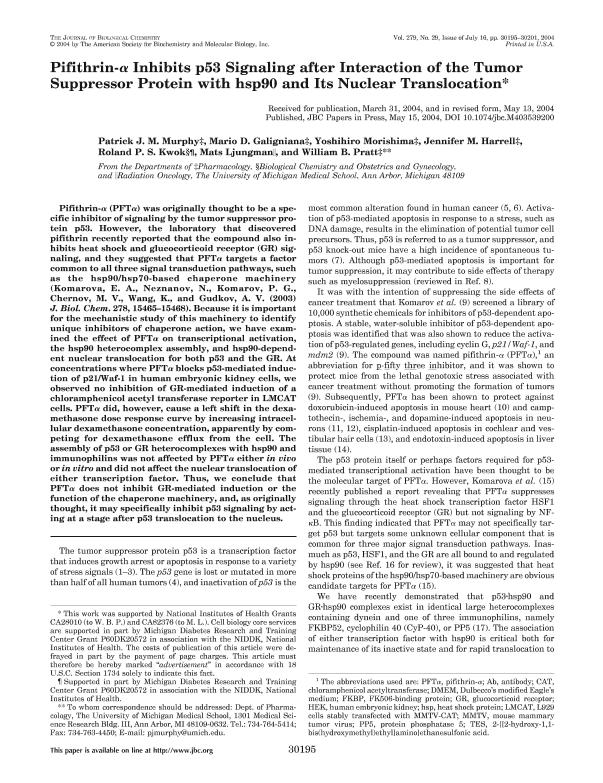Artículo
Pifithrin-alpha inhibits p53 signaling after interaction of the tumor suppressor protein with hsp90 and its nuclear translocation
Murphy, Patrick J.; Galigniana, Mario Daniel ; Morishima, Yoshihiro; Harrell, Jennifer M.; Kwok, Roland P.; Ljungman, Mats; Pratt, William B.
; Morishima, Yoshihiro; Harrell, Jennifer M.; Kwok, Roland P.; Ljungman, Mats; Pratt, William B.
 ; Morishima, Yoshihiro; Harrell, Jennifer M.; Kwok, Roland P.; Ljungman, Mats; Pratt, William B.
; Morishima, Yoshihiro; Harrell, Jennifer M.; Kwok, Roland P.; Ljungman, Mats; Pratt, William B.
Fecha de publicación:
2004
Editorial:
American Society for Biochemistry and Molecular Biology
Revista:
Journal of Biological Chemistry (online)
ISSN:
0021-9258
e-ISSN:
1083-351X
Idioma:
Inglés
Tipo de recurso:
Artículo publicado
Clasificación temática:
Resumen
Pifithrin-alpha (PFTalpha) was originally thought to be a specific inhibitor of signaling by the tumor suppressor protein p53. However, the laboratory that discovered pifithrin recently reported that the compound also inhibits heat shock and glucocorticoid receptor (GR) signaling, and they suggested that PFTalpha targets a factor common to all three signal transduction pathways, such as the hsp90/hsp70-based chaperone machinery (Komarova, E. A., Neznanov, N., Komarov, P. G., Chernov, M. V., Wang, K., and Gudkov, A. V. (2003) J. Biol. Chem. 278, 15465-15468). Because it is important for the mechanistic study of this machinery to identify unique inhibitors of chaperone action, we have examined the effect of PFTalpha on transcriptional activation, the hsp90 heterocomplex assembly, and hsp90-dependent nuclear translocation for both p53 and the GR. At concentrations where PFTalpha blocks p53-mediated induction of p21/Waf-1 in human embryonic kidney cells, we observed no inhibition of GR-mediated induction of a chloramphenicol acetyl transferase reporter in LMCAT cells. PFTalpha did, however, cause a left shift in the dexamethasone dose response curve by increasing intracellular dexamethasone concentration, apparently by competing for dexamethasone efflux from the cell. The assembly of p53 or GR heterocomplexes with hsp90 and immunophilins was not affected by PFTalpha either in vivo or in vitro and did not affect the nuclear translocation of either transcription factor. Thus, we conclude that PFTalpha does not inhibit GR-mediated induction or the function of the chaperone machinery, and, as originally thought, it may specifically inhibit p53 signaling by acting at a stage after p53 translocation to the nucleus.
Palabras clave:
Cell Nucleus
,
Dexamethasone
,
Hsp70
,
Hsp90
,
Immunophilins
,
Tumor Suppresor Protein
Archivos asociados
Licencia
Identificadores
Colecciones
Articulos(IBYME)
Articulos de INST.DE BIOLOGIA Y MEDICINA EXPERIMENTAL (I)
Articulos de INST.DE BIOLOGIA Y MEDICINA EXPERIMENTAL (I)
Citación
Murphy, Patrick J.; Galigniana, Mario Daniel; Morishima, Yoshihiro; Harrell, Jennifer M.; Kwok, Roland P.; et al.; Pifithrin-alpha inhibits p53 signaling after interaction of the tumor suppressor protein with hsp90 and its nuclear translocation; American Society for Biochemistry and Molecular Biology; Journal of Biological Chemistry (online); 279; 29; -1-2004; 30195-30201
Compartir
Altmétricas



